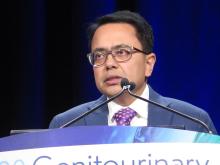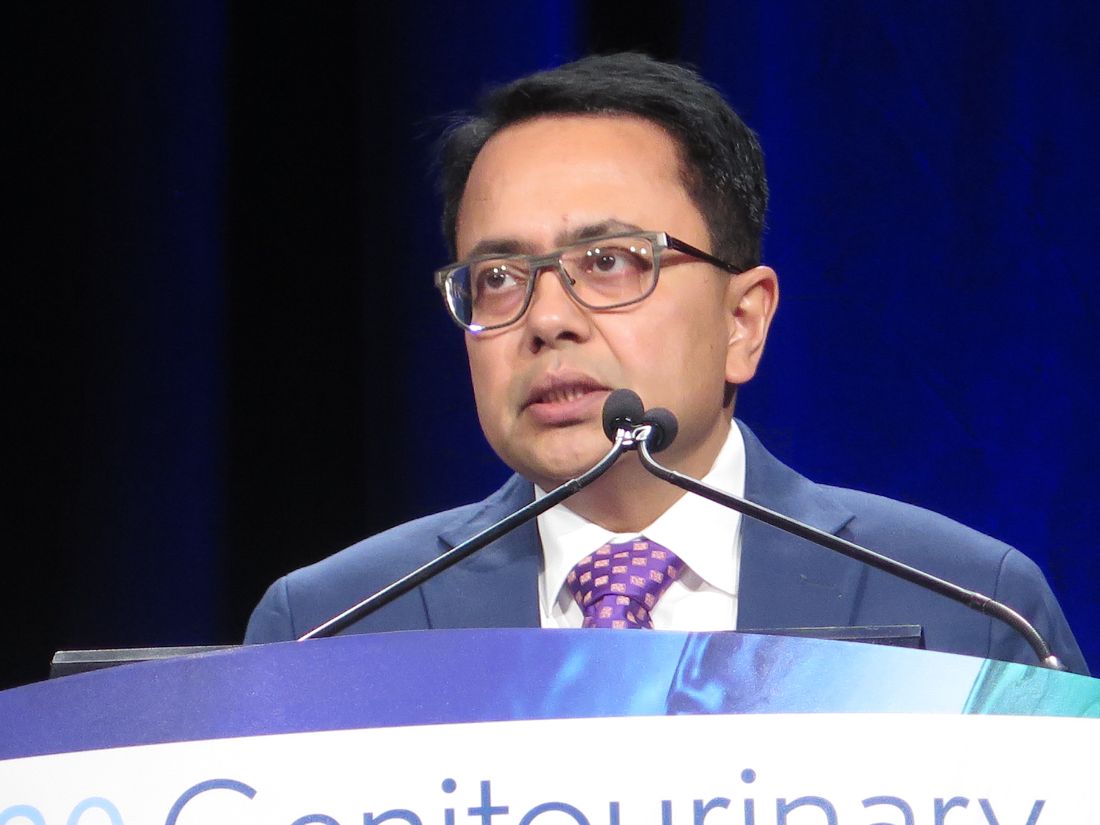User login
SAN FRANCISCO – , an exploratory analysis of the TITAN trial suggests.
Previous trial results for all 1,052 men randomized showed significant improvements in radiographic progression-free survival and overall survival from adding apalutamide versus placebo to androgen deprivation therapy (N Engl J Med. 2019;381:13-24), leading to recent Food and Drug Administration approval of the drug for metastatic castration-sensitive prostate cancer.
In the new analysis, investigators assessed progression-free survival 2 (PFS2), measured from time of randomization to investigator-determined disease progression or death, among the 277 men who went on to receive a subsequent life-prolonging therapy after progression on their trial therapy.
Results reported at the 2020 Genitourinary Cancers Symposium showed that the risk of PFS2 events was similarly reduced for patients who had initially received apalutamide vs. placebo regardless of whether their next therapy was a new hormonal therapy (32% reduction in risk) or a taxane (37% reduction in risk).
“The PFS2 benefit is an indicator of effective early intensification of treatment, is consistent with the overall survival benefit we have seen with this agent, and together shows totality of the treatment trajectory,” reported Neeraj Agarwal, MD, the study’s lead investigator. “These results may assist with counseling of patients with metastatic castration-sensitive prostate cancer who are contemplating various treatment options.”
The analysis was performed post hoc, and the subsequent therapy was left up to the treating clinicians, acknowledged Dr. Agarwal, professor of medicine and director of the genitourinary oncology program at the Huntsman Cancer Institute, University of Utah, Salt Lake City.
“A small number of events on subsequent therapy and the nonrandomized treatment decision preclude determination of best subsequent therapy based on these data,” he said. “We need further events and for data to mature more in order to pursue additional in-depth analysis.”
Some caveats
As only about a fifth of patients experienced PFS2 events, “these findings need to be interpreted with some caution,” said invited discussant Dana E. Rathkopf, MD, a genitourinary medical oncologist at Memorial Sloan Kettering Cancer Center in New York.
Another caveat is that the cohort analyzed comprised poor responders, who had experienced progression at a median of roughly 12 months whether on apalutamide or placebo, she noted. “If the patients were all on treatment for about 12 months, it does make me wonder why the apalutamide patients responded better than placebo patients to a second hormonal therapy, because you might think that, in the setting of poor response to upfront apalutamide, these patients may develop some type of intrinsic resistance that would suggest they would not respond to a second-line androgen receptor inhibitor relative to a taxane.”
Patients in TITAN were stratified on prior receipt of docetaxel before undergoing randomization. But simply by chance, among those receiving subsequent hormonal therapy, a larger share of those initially treated with apalutamide than of those initially treated with placebo had received the taxane (33% vs. 16%), which may have influenced outcomes, Dr. Rathkopf added.
“Further maturation of the data will tell us more,” she said. “But clearly, apalutamide in both the SPARTAN and TITAN trials improved PFS2 relative to placebo, and this begs the question of how we can better select treatment using predictive markers.”
Study details
Among the 277 men experiencing progression on their trial therapy and going on to receive a life-prolonging subsequent therapy, about 30% later received a new hormonal therapy – abiraterone or enzalutamide – and 35% subsequently received a taxane – docetaxel or cabazitaxel.
Overall, PFS2 was significantly better for men initially randomized to apalutamide, compared with counterparts initially randomized to placebo (hazard ratio for events, 0.66; P = .0026), Dr. Agarwal reported at the symposium, which was sponsored by the American Society of Clinical Oncology, ASTRO, and the Society of Urologic Oncology.
In stratified analyses, PFS2 was also significantly better with initial apalutamide vs. placebo whether patients went on to receive a new hormonal therapy (hazard ratio for events, 0.684; P = .0326) or taxane chemotherapy (hazard ratio for events, 0.634; P = .0062). Median values were not reached.
The trial was funded by Janssen Research & Development. Dr. Agarwal and Dr. Rathkopf each disclosed relationships with numerous pharmaceutical companies, including Janssen.
SOURCE: Agarwal N et al. GUCS 2020. Abstract 82.
SAN FRANCISCO – , an exploratory analysis of the TITAN trial suggests.
Previous trial results for all 1,052 men randomized showed significant improvements in radiographic progression-free survival and overall survival from adding apalutamide versus placebo to androgen deprivation therapy (N Engl J Med. 2019;381:13-24), leading to recent Food and Drug Administration approval of the drug for metastatic castration-sensitive prostate cancer.
In the new analysis, investigators assessed progression-free survival 2 (PFS2), measured from time of randomization to investigator-determined disease progression or death, among the 277 men who went on to receive a subsequent life-prolonging therapy after progression on their trial therapy.
Results reported at the 2020 Genitourinary Cancers Symposium showed that the risk of PFS2 events was similarly reduced for patients who had initially received apalutamide vs. placebo regardless of whether their next therapy was a new hormonal therapy (32% reduction in risk) or a taxane (37% reduction in risk).
“The PFS2 benefit is an indicator of effective early intensification of treatment, is consistent with the overall survival benefit we have seen with this agent, and together shows totality of the treatment trajectory,” reported Neeraj Agarwal, MD, the study’s lead investigator. “These results may assist with counseling of patients with metastatic castration-sensitive prostate cancer who are contemplating various treatment options.”
The analysis was performed post hoc, and the subsequent therapy was left up to the treating clinicians, acknowledged Dr. Agarwal, professor of medicine and director of the genitourinary oncology program at the Huntsman Cancer Institute, University of Utah, Salt Lake City.
“A small number of events on subsequent therapy and the nonrandomized treatment decision preclude determination of best subsequent therapy based on these data,” he said. “We need further events and for data to mature more in order to pursue additional in-depth analysis.”
Some caveats
As only about a fifth of patients experienced PFS2 events, “these findings need to be interpreted with some caution,” said invited discussant Dana E. Rathkopf, MD, a genitourinary medical oncologist at Memorial Sloan Kettering Cancer Center in New York.
Another caveat is that the cohort analyzed comprised poor responders, who had experienced progression at a median of roughly 12 months whether on apalutamide or placebo, she noted. “If the patients were all on treatment for about 12 months, it does make me wonder why the apalutamide patients responded better than placebo patients to a second hormonal therapy, because you might think that, in the setting of poor response to upfront apalutamide, these patients may develop some type of intrinsic resistance that would suggest they would not respond to a second-line androgen receptor inhibitor relative to a taxane.”
Patients in TITAN were stratified on prior receipt of docetaxel before undergoing randomization. But simply by chance, among those receiving subsequent hormonal therapy, a larger share of those initially treated with apalutamide than of those initially treated with placebo had received the taxane (33% vs. 16%), which may have influenced outcomes, Dr. Rathkopf added.
“Further maturation of the data will tell us more,” she said. “But clearly, apalutamide in both the SPARTAN and TITAN trials improved PFS2 relative to placebo, and this begs the question of how we can better select treatment using predictive markers.”
Study details
Among the 277 men experiencing progression on their trial therapy and going on to receive a life-prolonging subsequent therapy, about 30% later received a new hormonal therapy – abiraterone or enzalutamide – and 35% subsequently received a taxane – docetaxel or cabazitaxel.
Overall, PFS2 was significantly better for men initially randomized to apalutamide, compared with counterparts initially randomized to placebo (hazard ratio for events, 0.66; P = .0026), Dr. Agarwal reported at the symposium, which was sponsored by the American Society of Clinical Oncology, ASTRO, and the Society of Urologic Oncology.
In stratified analyses, PFS2 was also significantly better with initial apalutamide vs. placebo whether patients went on to receive a new hormonal therapy (hazard ratio for events, 0.684; P = .0326) or taxane chemotherapy (hazard ratio for events, 0.634; P = .0062). Median values were not reached.
The trial was funded by Janssen Research & Development. Dr. Agarwal and Dr. Rathkopf each disclosed relationships with numerous pharmaceutical companies, including Janssen.
SOURCE: Agarwal N et al. GUCS 2020. Abstract 82.
SAN FRANCISCO – , an exploratory analysis of the TITAN trial suggests.
Previous trial results for all 1,052 men randomized showed significant improvements in radiographic progression-free survival and overall survival from adding apalutamide versus placebo to androgen deprivation therapy (N Engl J Med. 2019;381:13-24), leading to recent Food and Drug Administration approval of the drug for metastatic castration-sensitive prostate cancer.
In the new analysis, investigators assessed progression-free survival 2 (PFS2), measured from time of randomization to investigator-determined disease progression or death, among the 277 men who went on to receive a subsequent life-prolonging therapy after progression on their trial therapy.
Results reported at the 2020 Genitourinary Cancers Symposium showed that the risk of PFS2 events was similarly reduced for patients who had initially received apalutamide vs. placebo regardless of whether their next therapy was a new hormonal therapy (32% reduction in risk) or a taxane (37% reduction in risk).
“The PFS2 benefit is an indicator of effective early intensification of treatment, is consistent with the overall survival benefit we have seen with this agent, and together shows totality of the treatment trajectory,” reported Neeraj Agarwal, MD, the study’s lead investigator. “These results may assist with counseling of patients with metastatic castration-sensitive prostate cancer who are contemplating various treatment options.”
The analysis was performed post hoc, and the subsequent therapy was left up to the treating clinicians, acknowledged Dr. Agarwal, professor of medicine and director of the genitourinary oncology program at the Huntsman Cancer Institute, University of Utah, Salt Lake City.
“A small number of events on subsequent therapy and the nonrandomized treatment decision preclude determination of best subsequent therapy based on these data,” he said. “We need further events and for data to mature more in order to pursue additional in-depth analysis.”
Some caveats
As only about a fifth of patients experienced PFS2 events, “these findings need to be interpreted with some caution,” said invited discussant Dana E. Rathkopf, MD, a genitourinary medical oncologist at Memorial Sloan Kettering Cancer Center in New York.
Another caveat is that the cohort analyzed comprised poor responders, who had experienced progression at a median of roughly 12 months whether on apalutamide or placebo, she noted. “If the patients were all on treatment for about 12 months, it does make me wonder why the apalutamide patients responded better than placebo patients to a second hormonal therapy, because you might think that, in the setting of poor response to upfront apalutamide, these patients may develop some type of intrinsic resistance that would suggest they would not respond to a second-line androgen receptor inhibitor relative to a taxane.”
Patients in TITAN were stratified on prior receipt of docetaxel before undergoing randomization. But simply by chance, among those receiving subsequent hormonal therapy, a larger share of those initially treated with apalutamide than of those initially treated with placebo had received the taxane (33% vs. 16%), which may have influenced outcomes, Dr. Rathkopf added.
“Further maturation of the data will tell us more,” she said. “But clearly, apalutamide in both the SPARTAN and TITAN trials improved PFS2 relative to placebo, and this begs the question of how we can better select treatment using predictive markers.”
Study details
Among the 277 men experiencing progression on their trial therapy and going on to receive a life-prolonging subsequent therapy, about 30% later received a new hormonal therapy – abiraterone or enzalutamide – and 35% subsequently received a taxane – docetaxel or cabazitaxel.
Overall, PFS2 was significantly better for men initially randomized to apalutamide, compared with counterparts initially randomized to placebo (hazard ratio for events, 0.66; P = .0026), Dr. Agarwal reported at the symposium, which was sponsored by the American Society of Clinical Oncology, ASTRO, and the Society of Urologic Oncology.
In stratified analyses, PFS2 was also significantly better with initial apalutamide vs. placebo whether patients went on to receive a new hormonal therapy (hazard ratio for events, 0.684; P = .0326) or taxane chemotherapy (hazard ratio for events, 0.634; P = .0062). Median values were not reached.
The trial was funded by Janssen Research & Development. Dr. Agarwal and Dr. Rathkopf each disclosed relationships with numerous pharmaceutical companies, including Janssen.
SOURCE: Agarwal N et al. GUCS 2020. Abstract 82.
REPORTING FROM GUCS 2020


